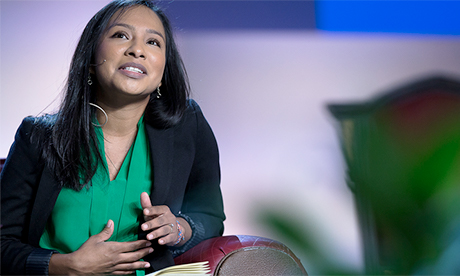It was a gathering where the stakes could not have been higher.
As one young delegate said to me, “The church is living at an inflection point; these are truly urgent times.”
This young Latino had just witnessed the close of the national gathering meant to culminate the “Encuentro” (encounter, meeting,) process of the past year.
Conversations around tables and hallways witnessed to this historical moment.
One topic of conversation had dominated the headlines for months, only to be dwarfed recently by a second.
The first, the relentless attack on immigrants and the animus toward Latinos in the United States, was on the mind of most delegates.
But the second problem had pushed immigration out of the headlines.
The hierarchy of the U.S. Catholic Church was implicated and under investigation in several states, with evidence piling up of unspeakable crimes of sexual abuse by clergy and those who covered it up.
And so we mourned doubly: for the suffering of countless victims of sexual abuse and for the loss of the moral authority of our church to speak out on other issues.
What would a national gathering of over 3,000 Hispanic Catholics, centered on Pope Francisco’s exhortation to be missionary disciples to the peripheries look like in this atmosphere?
The delegates expected to deal with the painful reality and hoped to nurture their resolve for the hard work ahead, and in many corners of the Encuentro, this happened in conversation.
A determination to serve and help was voiced often by delegates of all ages.
Young adults are ready and willing to take on responsibility for and within the church. And many already have. The feeling of sometimes being treated as children dismayed young leaders.
Church acceptance of God-given talents
We also heard often the rejection, followed by the hope that, at this moment of upheaval in the church and in our nation, the dones (talents and commitments) of Latinx Catholics will be accepted and valued.
Yet, as I spoke with my fellow participants and observed the events, what became clear was that, at times, the formal program revealed an institution still struggling to meet the needs of the moment.
Ongoing conversation
Drawing on these conversations and observations, I would like to suggest a few points that may help guide the ongoing conversation about the needs of the Latinx church.
Young adults are ready and willing to take on responsibility for and within the church. And many already have.
The feeling of sometimes being treated as children dismayed young leaders.
One young woman with major responsibilities at her diocese and a master’s degree in theology felt that the meeting for the bishops and young adults was too focused on “music and chanting and an atmosphere that did not take us seriously.”
The young adults I spoke with felt that at times their roles as lay ministers running offices and parish programs were not understood.
Juan Pablo Padilla, the coordinator for youth and young adult ministry/pastoral juvenil for the Archdiocese of Chicago confronted the bishops in one of the few moments of candor.
He urged the critical reorganization of power structures, especially at parishes, noting that “young people are often not even given a place to meet by resistant pastors.”
Reminding us that the majority of young Catholics in the United States are Latinas/os, he asked the bishops to make budget adjustments and inclusion efforts in order to give lay Latinx Catholics the respect, autonomy and authority to do the work they have been trained to do.
Inclusion of women is critical to engagement
Although some bishops are committed to nurturing Latinx lay leadership, this was not evident in much of the program.
Despite the presence of exceedingly qualified lay experts and religious women, few had prominent roles as presenters of content or reflections.
Similarly, during the Visperas and Laudes (morning and evening prayers) and Eucharistic liturgies, a total of seven worship celebrations, women were excluded from almost all of the liturgical ministries.
Accustomed to being actively involved in the worship life of their parishes, this shocked many of the women present. Continue reading
- Edith Avila Olea, associate director for justice and peace in the Diocese of Joliet, Ill., speaks to delegates during the “Getting Involved” panel presentation Sept. 21 at the Fifth National Encuentro, in Grapevine, Texas.
- Image: CNS
Additional reading
News category: Analysis and Comment.




